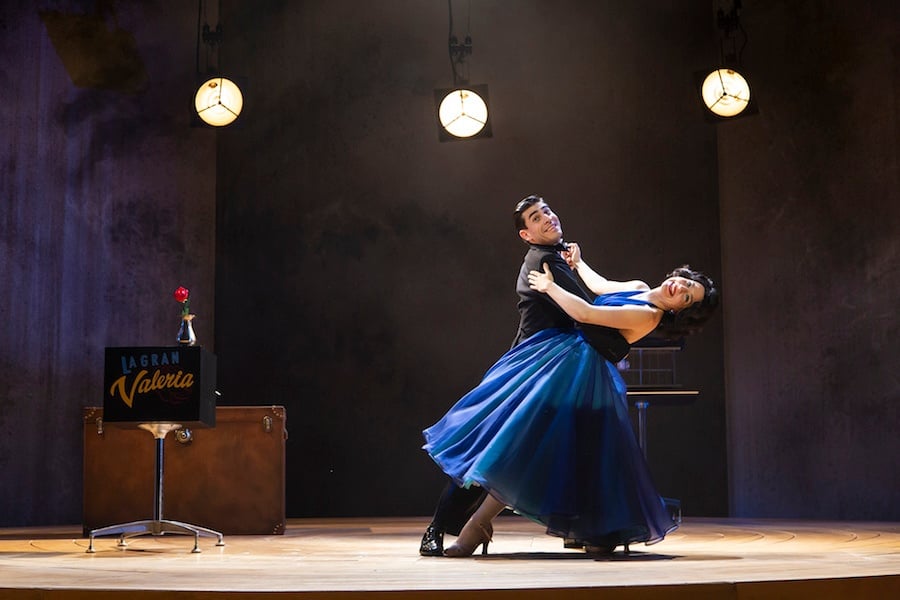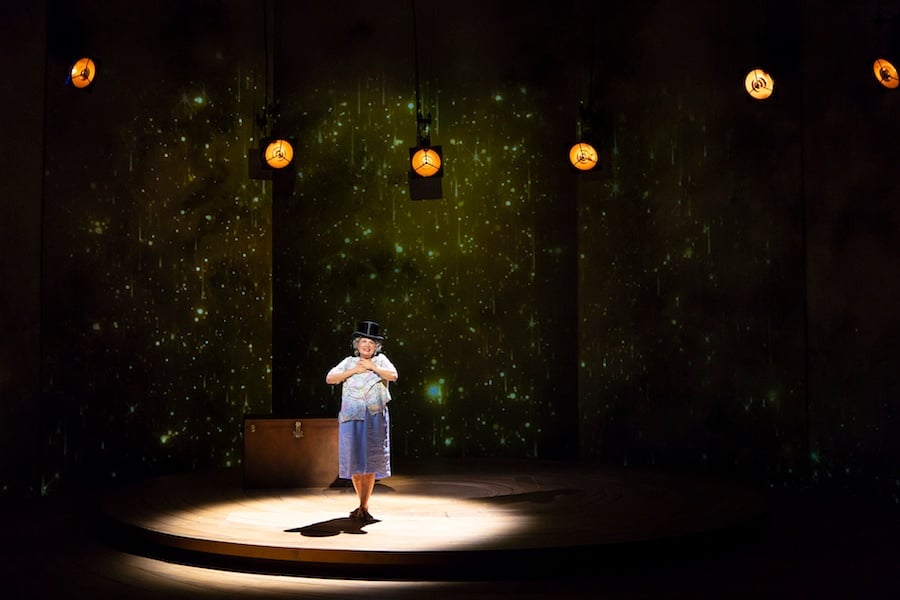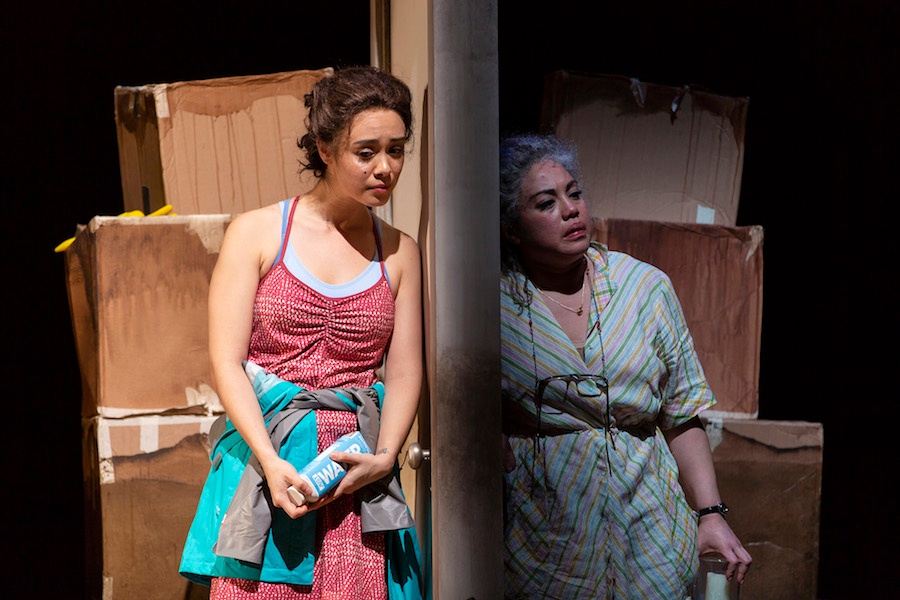
Arts & Culture | Theater | Yale Rep Theatre

| Arturo Soria and Irene Sofia Lucio as Alonso and Valeria in El Huracán by Charise Castro Smith, directed by Laurie Woolery. Photo by T. Charles Erickson, 2018. |
El Huracán begins with a magic show of epic proportions. It ends in the aftermath of an unprecedented hurricane. The challenge in between is to suspend your disbelief, let darkness and rain descend, and try to weather the storm.
The play runs at Yale's University Theatre through Oct. 20. It marks the Rep’s first collaboration with The Sol Project, a nascent initiative to center, celebrate and bring awareness to the voices of Latinx playwrights across the country. Tickets and more information are available at the Yale Repertory Theatre's website.
Written by Charise Castro Smith and directed by Laurie Woolery, El Huracán tells a story of migration, family, and the inevitability of genetic inheritance. Much to the Rep’s benefit, the play is told in a mix of English and Spanish, which feels overdue two years after Teatro a Mil’s Escuela graced New Haven for just three days. The production team has taken a note on this diasporic family drama—program notes hone in on the Cuba that Valeria knew, pre-show announcements are bilingual, and there's no sort of closed captioning. If you don't know Spanish, too bad for you (although to their credit, actors are animated enough to get the message across, and the Spanish in the show is not complex).
When we meet our characters—three generations of Cuban and Cuban-American women, all products of Castro’s rule and diaspora—the year is 1992, and Miami is on the cusp of Hurricane Andrew. An old woman floats onto the stage, a ghost of her younger self. Her mouth trembles. Feet drag. Somewhere in the house a radio crackles to life. History speeds up and slows down, freezes and unfreezes all in the same place. There's magic lurking here.
These women are worldbuilders of the most understated variety. There is Valeria (Adriana Sevahn Nichols), a powerful matriarch felled by Alzheimers, and jailed in some of her earliest, most vivid memories. Her daughter Ximena (Maria-Christina Oliveras) has become her faithful caregiver while her granddaughter Miranda (Irene Sofia Lucio), has fled Miami to pursue a doctorate in film and media studies at Harvard University. Miranda’s daughter Val (Jennifer Paredes) enters the play 27 years later, as time spins madly onward and Miami suffers its first category six hurricane.

| Adrianna Sevahn Nichols as Valeria in El Huracán by Charise Castro Smith, directed by Laurie Woolery. Photo by T. Charles Erickson, 2018. |
There’s so much that doesn’t fit into a linear narrative here—family, it seems, so rarely does— and Smith has devised a time-hopping framework that works. Sort of. As the storm prepares to strike, Valeria’s past is revealed in snippets of memory: her flight from a small town, deep love for her husband, years of performing magic in Havana’s famed Tropicana Club, and migration to the U.S., all overshadowed by immense loss and the growing threat of climate change.
In this trick of memory, the creative team has leaned all the way in: they do not just reference magic but make it onstage, so wondrous that it is impossible not to believe something bigger is at play. In the opening sequence, Magic Designer Christopher Rose has created a whole universe where memory, like the silk scarves magicians wield, can get pulled apart and put back together, stretch for miles, and appear out of thin air. It’s a place where Frank Sinatra, crooned in two different languages, sets the soundtrack, and every wrong can be righted with the flip of a hat.
What follows is a storm of incredibly tight production. Taking advantage of the entire stage, Yaara Bar has pulled off several stunning projections: not just the driving rain and wind of a hurricane, but a sea of memory through which we must swim with Valeria, to which she has lost her most prized and magical possession. Scenic designer Gerardo Díaz Sánchez has done moving work with the space, so minimal at times that the theater’s walls and floors become characters in this show about survival. But Sánchez surprises us with grandiose gestures too: a façade bursts from the floor, a magic show builds in seconds, and an understated, middle-class Miami home becomes ground zero for the play’s most sweeping, cyclonic action.

| Jennifer Paredes and Maria-Christina Oliveras in El Huracán by Charise Castro Smith, directed by Laurie Woolery. Photo by T. Charles Erickson, 2018. |
These magical stakes are so high, and so tangible, that the fourth wall is deafening when it falls. Close to the play’s halfway point, Miranda and Ximena step forward, addressing the audience directly for the first and only time in the show. As they speak of the storm that tore their family apart, they sprint forward 27 years, helped into bodysuits as they strip down, and don the mom jeans, muumus, and thick-rimmed glasses that come with age. It’s a narrative device that gets us up to speed: Miranda has committed a wrong too grave to be righted, returned to the East Coast, and had a daughter of her own. The storm lurking in Ximena’s head has stayed at bay—for a while. But all of that is threatened by Hurricane Penelope, the city’s greatest storm yet.
Smith has a gift for interweaving these tempests: the daughter who does not visit home enough and has let her Spanish fizzle, the mother who is so tired and so strapped for resources, the grandmother whose mind dredges up treasure from the deepest depths of memory. Later, the granddaughter who so wants to know about her heritage, and must ride out an unexpected homecoming. Performed against the constant, lurking backdrop of the United Nation’s climate report and specter of disease, it’s immediately relatable—not just because Miami is hotter than it was 27 years ago, but because we all have a Valeria in our lives.
But at points, El Huracán does not know what to do with its own propulsion. Smith’s love for language, at its most winning, gives the play the humor and soul. But it is also young and overgrown—sometimes we feel like we’re at a high school poetry slam, where there are so many beautiful words packed so tightly together, they don’t amount to anything at all. There’s a cumbersome anecdote about a tree’s roots taking over a house that we’ve definitely heard somewhere before. Or a passionate scene between Alonso and Valeria where words of love fall flat, and silence is the most powerful device of all. In the most succinct blow to the show, Smith sticks the ending—our characters are still in the storm, but they’ve learned how to weather it together—and then keeps going, diluting the power of their words as she does.
And yet, it’s a storm that we want to see the end of. As Valeria, Nichols steps into her disease without ever mocking those who have it, a tremor defining the edges of her mouth as she shuffles around the stage and breaks suddenly into dance and song. There is respect and reverence there, so careful that it seems she could step off of the stage, and into a discussion on aging and homecare. In Miranda’s shoes, Lucio is fiery, in full form as she dips into childhood memories, and pulls them out for a boy (MFA candidate Arturo Soria, who plays Young Alonso, Fernando, and Theo). Oliveras finds a steely vulnerability as Ximena, keeping it together until she can’t anymore, and cracks under its weight. And Jennifer Paredes pulls on our heartstrings: first as Valeria’s late sister Alicia, and then as Miranda’s daughter Val.
When the lights come down on El Huracán, there’s a feeling that one storm has ended, and another is just beginning. We would do well to pull out our rain boots and flashlights and emergency candles, gather the troops, and see it through.

